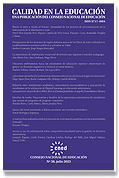Vocational Exploration Experiences of Students Who Entered Initial Teacher Training
DOI:
https://doi.org/10.31619/caledu.n58.1196Keywords:
Higher Education, Initial Teacher Training, Vocational Exploration, Pedagogy StudentsAbstract
The Chilean Teacher Professional Development System diversifies access to Pedagogy studies. It entrusts Higher Education Institutions the responsibility to create programs for the preparation and access intended for secondary education, in order to attract young people with greater abilities. Thus, the need to know the characteristics of those who show an early interest in the career arises. This article shows the results of a qualitative study, using biorams and focus groups. The discourse of eighteen young people studying their first year on Pedagogy programs were analyzed. To know personal, social and school aspects of their vocational exploration experiences, and understand which ones favored their interest and what resources they mobilized. The results describe experiences involved in such exploration, the resources that are mobilized, and the conditions and contexts in which they are carried out. Results allow us to conclude that it is a subjective, fragmented, and unassisted experience that responds to the context, in occasional interactions with family and school actors. The findings allow for the design of accompaniment processes throughout secondary education, to strengthen the disposition to Pedagogy and to respond to institutional challenges of improvement in the mechanisms for appealing future teachers.
Downloads
Published
Issue
Section
License
Authors retain their Copyright and only transfer a part of these to the journal, accepting the following conditions:
Authors keep their rights as authors and guarantee the right to the journal for the first publication of their work, which is simultaneously subject to the Creative Commons Attribution license allowing third parties to share the study accrediting the author and first publication in this journal.
Authors may adopt other non-exclusive license agreements for distribution of the version of the published work (e.g. inclusion in an institutional thematic file or publication in a monographic volume) accrediting initial publication in this journal.
Authors are allowed and recommended to share their work over the Internet (e.g. in institutional telematic files or their website) before and during the submission process, which may lead to interesting exchanges and increased citation of the published work. (See The effect of open access).

